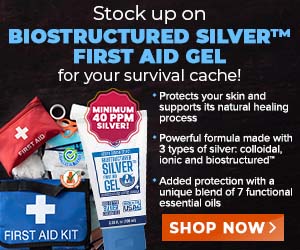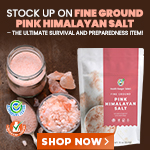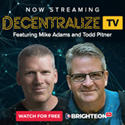
Take Notice of the Sustainability Factor and the Disposable Economy of the World, Part III
Wednesday, December 02, 2009 by: Aaron Turpen
Tags: world economy, sustainability, health news
- The global die-off and urban collapse will lead to a resurgence in decentralized governance and self-reliant living
- DEADLY chemical herbicide GLYPHOSATE gets DOUSED onto U.S. wheat, barley, rye and beans as a DRYING AGENT before harvest
- After meeting with Bill Gates, the Trump transition team sidelines two key figures spreading vaccine truth
- Dr. Leonard Coldwell on Decentralize TV: Only 0.8% of humanity will survive the coming GLOBAL COLLAPSE
- Trump proves critics wrong, appoints prominent LGBT figures to key administrative roles
- Top 10 ways the Biden years were the WORST 4 YEARS in the history of our nation, and congratulations for surviving
- Team AGES and Mike Adams expose the LUCIFERIAN agenda behind Big Pharma’s TURBO CANCER treatments
- The global depopulation catastrophe where billions of vaccinated individuals die off is coming
- W.E.F. C40 SMART CITIES: Dystopian nightmare where elitist ruling class can literally SHUT OFF power, vehicles, food, internet and money anytime for any reason
- Trump's pardon promise for Jan. 6 defendants sparks debate over justice, loyalty and democracy
- Sadiq Khan faces scrutiny over reluctance to address questions about grooming gangs
- LA’s wildfires expose stark divide: Millionaires hire $2,000-an-HOUR private firefighters while regular homeowners are left to fend for themselves
- BOMBSHELL: Los Angeles and Maui infernos likely started using PATENTED ENERGY WEAPON that lights anything on FIRE unless it's blue
- Mike Adams and Dane Wigington expose the truth: Are homes being intentionally ignited in California?
- Supreme Court upholds TikTok ban, setting stage for Trump's next move
- Constitution Party presidential candidate launches ads to steer votes away from infanticidal Kamala Harris
- Two containers with completed ballots fall out of truck in Florida
- Britain’s systemic capitulation to Pakistani-Muslim rape gangs is a moral bankruptcy and cultural submission
- Shocking report in the UK finds 95% of COVID-19 deaths were among the vaccinated
- Mike Adams and Dane Wigington expose the truth: Are homes being intentionally ignited in California?
- The DEMOCRAT DIE-OFF is coming thanks to mass COVID-19 vaccination
- The global depopulation catastrophe where billions of vaccinated individuals die off is coming
- Dr. Bryan Ardis BLOWS THE WHISTLE on COVID-19 and CLOT SHOTS attacking the body like snake venom and he speaks on detoxification and prevention of damage
- Facebook’s ‘free speech’ overhaul ‘opened season on just about every topic except one’
- Fearing tariffs, Mexico scrambling to disperse migrant caravans ahead of Donald Trump’s inauguration
- Two containers with completed ballots fall out of truck in Florida
- Constitution Party presidential candidate launches ads to steer votes away from infanticidal Kamala Harris
- California wildfires push home insurance to the brink: Will homes remain insurable?
- Hidden dangers: Cocoa products found to be contaminated with high levels of cadmium and lead
- Dems panicked that secretive government censorship agency will be terminated if Trump wins
- Adam Carolla lambasts Democrats over handling of California fires, predicts liberals will flee
- FACT CHECK: Trump’s pick for surgeon general, Dr. Janette Nesheiwat, praised COVID “vaccines,” calling them “a gift from God”
- Fungus spreading worldwide could cause the EXTINCTION of blueberries
- “Cleansing the Bloodline” unpacks dark history of good versus evil in online teaching series
- Facebook drops fact-checkers, embraces free speech in major policy shift
- Top 8 Kommie Harris "policies" and why Democrats and Liberals should RECONSIDER their vote before it’s too late
- Shocking report in the UK finds 95% of COVID-19 deaths were among the vaccinated
- Scientists confirm: GENIUS brain function can be spontaneously unleashed in humans without any apparent cause
- PRION-CONTAMINATED PORK ALERT: All across the United States, pigs can be "vaccinated" with millions of deadly prions via mRNA clot shots - UNLABELED
- 10 Habits all preppers follow
- BOMBSHELL: Covid-19 mRNA nanoparticles EMIT LIGHT SIGNALS that communicate MAC addresses used for self-assembly inside the blood vessels
- Learn how to regenerate and repair your liver in upcoming “Fatty Liver Docu-Class” that begins Feb. 25th – register here
- HYSSOP: What research reveals about the health benefits of this ancient holy herb
- Two containers with completed ballots fall out of truck in Florida
- Careless Whisper: AI-powered transcription tool being used by hospitals found to invent chunks of text no one ever said
- Tomatoes found to halt stomach cancer due to anti-cancer nutrients
- Constitution Party presidential candidate launches ads to steer votes away from infanticidal Kamala Harris
- Election fraud rears head in Pennsylvania as local official “dropped off and dumped numerous amount” of fraudulent voter registrations
- Dems panicked that secretive government censorship agency will be terminated if Trump wins
- Mike Adams Sermon 89: GOD’S JUDGMENT upon the WICKED
- Journo-terrorism is ‘weaponized journalism’ carried out by the Washington Post, CNN and NYT
- Journo-terrorism: NYT calls for online trolls to sabotage Breitbart.com’s revenues
- Anti-Zionist Jewish group says Israel is “perpetrating a holocaust” in Gaza
- Top 8 Kommie Harris "policies" and why Democrats and Liberals should RECONSIDER their vote before it’s too late
- Red Cross issues warning to stop blood plasma donations from vaccinated people
- Scientists confirm: GENIUS brain function can be spontaneously unleashed in humans without any apparent cause
- DATA: England’s vaccinated population had close to one million deaths in 23 months; unvaccinated population had less than 61,000 deaths over the same period
- Arizona residents drive entire Maricopa County Board of Supervisors out of meeting after serving them for TREASON
- Fully vaccinated about to see “tsunami” of illness and death, warns virologist
- Today I asked our AI language model “Neo” about which phytonutrients or phytochemicals can block the spike protein related to SARS-CoV-2 … Here is what it answered…
- BREAKING: 2025 NDAA authorizes mandatory military draft of WOMEN across America… as Pentagon pursues global NUCLEAR war with both Russia and China at the same time
- HYSSOP: What research reveals about the health benefits of this ancient holy herb
- We are building the infrastructure of human freedom… Brighteon.AI is the next launch that will put life-altering LLM technology into your hands for free
- Michael Yon warns of a ZIONIST TAKEOVER in Trump’s second administration
- NASA admits that climate change occurs because of changes in Earth’s solar orbit, and NOT because of SUVs and fossil fuels
- ENGINEERED FAMINE: Oregon starts SHUTTING DOWN small farms “to protect the people”
- Ozempic and Wegovy weight loss drugs are injectable LIZARD VENOM PEPTIDES that may unleash a devastating wave of organ failure… side effects align with symptoms of SNAKE BITES
- These 13 countries just signed an agreement to engineer a global FAMINE by destroying food supply
- BBC staffers accuse media outlet’s executives of instituting bias in Gaza coverage, claiming favorable treatment of Israel
- Casual restaurant chain TGI Fridays files for BANKRUPTCY
- Instead of adding PINK RIBBONS to products for "Cancer Awareness" month, companies should actually remove the ingredients that CAUSE cancer
- 5G REMOTE KILL VECTOR: Science paper reveals cell phone signals can activate the release of biological PAYLOADS from graphene oxide injected into the body
To grow these crops using our modern, industrial methods requires a lot of resources. It requires oil for the machinery and transportation, artificial fertilizers (nitrogen, potassium, and phosphorous), and water.
All of these crops, cereal grains especially, require potassium (commonly called "potash") to thrive, especially when farmed industrially. Potash is literally mined out of the ground (it is a mineral). Between 2006 and 2008, the price of potash went up by 500%. It's still rising. We`re running out of "easy" potash.
Water is another resource growing more scarce. The planet is 2/3 water, but only 2% of that is fresh water. Most of that fresh water is polar ice, glaciers, and in the atmosphere. What`s left is fresh water that we can utilize. It cycles at a given rate. Currently, we use 30% more than there is in America and 50% more than there is in China, and it gets little better as we circle the globe. Most of the excess comes from aquifers, which are quickly drying up.
Oil has peaked, which leaves nitrogen. Nitrogen we aren`t running out of, but we're heavily over-using it. Again, because of industrial farming. Nitrogen is so cheaply acquired that farmers can dump it by the train load on their fields without concern. The excess runs off into groundwater and eventually into rivers and the ocean.
At the mouth of the Mississippi River, where it dumps into the Gulf of Mexico, there is a huge "dead zone." It stretches from Louisiana to Houston, Texas and out into the Gulf nearly five miles from its source. That dead zone is due to all of that nitrogen raging into and down the Mississippi and into the Gulf.
The nitrogen causes an explosion of algal growth, soaking it up. That algae breathes the oxygen in the water, sucking it up at such a rate that anything else that requires oxygen (basically everything living) either dies or has to leave. These dead zones are at the mouth of nearly every river in the world.
Many people are under the impression that we can just magically switch from our current, industrial methods of farming to organic and more sustainable methods whenever we need to. This is not the case. Even disregarding USDA Organic requirements, it takes several years (close to a decade) for a farm to move from synthetic fertilization to organic methods. The soil requires time to recover.
So, we face a big decision as humans. Do we continue as we are and eventually starve to death when the resources start to run out? Or do we change our ways and hope that in the next generation (or less), we can reverse the trend and become sustainable?
It`s not a question for governments; it`s a question for people. We all have to change, individually and in communities. That change can`t come by government coercion. It comes through personal life choices that you must make, your family must make, your neighbors, friends, and community must make.
It starts, however, with you. Are you sustainable yet?
Resources:
Municipal Solid Waste in the United States, Facts and Figures, U.S. Environmental Protection Agency
Landfill Data From China: Addressing Information Needs for Methane Recovery, A. Robinson U.S. Environmental Protection Agency, et al.
The Sustainability Factor: What Sustainability Means and Why You Need to Know, by Aaron Turpen
Minerals Scarcity: A Call for Managed Austerity and the Elements of Hope, by Dr. Andre M. Diederen, Msc.
About the author
Aaron Turpen is a professional writer living in Wyoming in the USA. His blogs cover organic/sustainable living and environmental considerations (AaronsEnvironMental.com) and the science debunking mainstream medical and proving alternatives (HiddenHealthScience.com).World economy at FETCH.news
Get independent news alerts on natural cures, food lab tests, cannabis medicine, science, robotics, drones, privacy and more.
Take Action: Support Natural News by linking to this article from your website
Permalink to this article:
Embed article link: (copy HTML code below):
Reprinting this article:
Non-commercial use OK, cite NaturalNews.com with clickable link.
Follow Natural News on Facebook, Twitter, Google Plus, and Pinterest
Science News & Studies
Medicine News and Information
Food News & Studies
Health News & Studies
Herbs News & Information
Pollution News & Studies
Cancer News & Studies
Climate News & Studies
Survival News & Information
Gear News & Information
News covering technology, stocks, hackers, and more



"Big Tech and mainstream media are constantly trying to silence the independent voices that dare to bring you the truth about toxic food ingredients, dangerous medications and the failed, fraudulent science of the profit-driven medical establishment.
Email is one of the best ways to make sure you stay informed, without the censorship of the tech giants (Google, Apple, Facebook, Twitter, YouTube, etc.). Stay informed and you'll even likely learn information that may help save your own life."
–The Health Ranger, Mike Adams












































